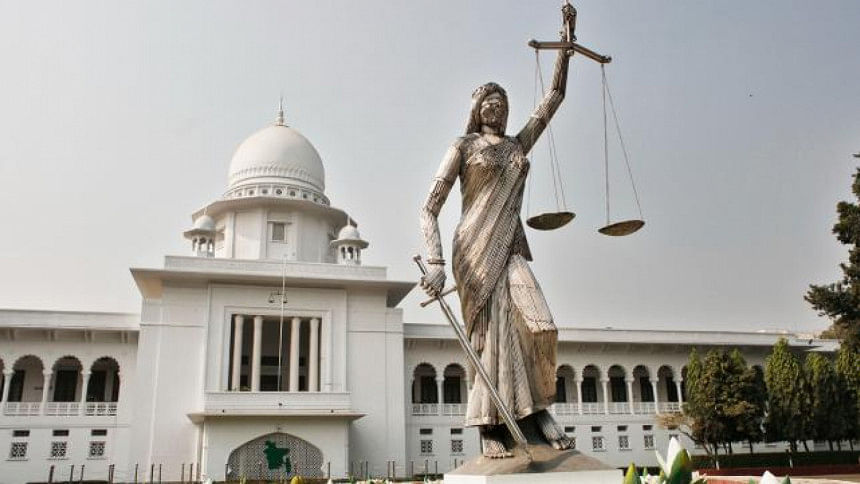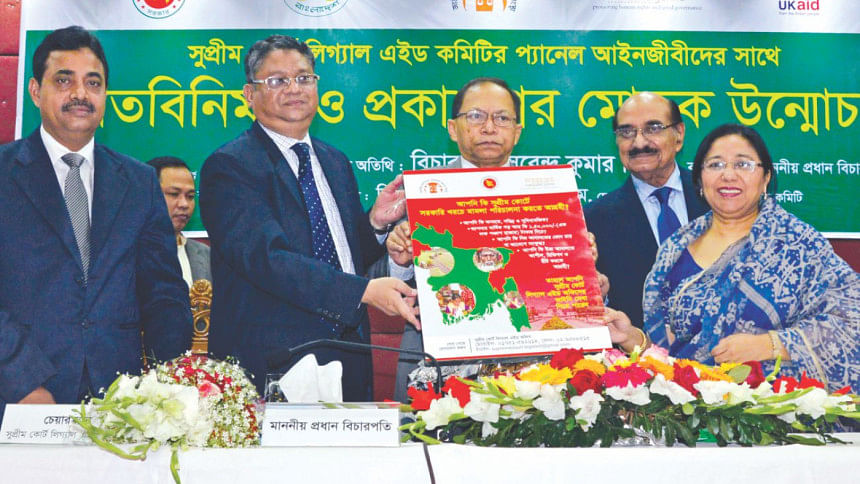Opinion: Party's feast at the cost of justice

While speaking about the sorry state of public prosecution, Chief Justice SK Sinha has once again decried the present pervasive system of appointing lawyers loyal to the ruling party as public prosecutors.
Speaking as chief guest at a programme on Saturday, he described how partisan approach about appointing prosecutors has worsened the situation over the years.
Also READ: Pro-ruling party lawyers appointed prosecutors
He said earlier in every district, famous and renowned lawyers used to be appointed in the panel of prosecution. "This post was dignified. The system continued for a long time. But it's not being implemented now-a-days," he said.

In the present system, one's expertise in criminal laws matters little. What is a must for his appointment as a prosecutor is his loyalty to the party in power.
Lack of effective procedure to screen and appoint prosecutors sometimes generates embarrassing situations. For example, in June 2007, a lawyer accused of a murder was appointed public prosecutor in Naogaon district. He was appointed by the district magistrate with the law ministry's approval.
Pro-ruling party lawyers who have good knowledge in criminal laws do not want to be public prosecutors. It is because of poor remuneration.
A prosecutor, additional prosecutor or special prosecutor gets just Tk 500 to represent the government in one case. This is all he gets for a day's work, even if he represents 10 cases that day, according to prosecutors in Dhaka metropolitan courts.
Yet, many pro-ruling party lawyers find the job lucrative as the office is dignified and make them 'powerful' in local politics. Some of them allegedly misuse of the powers for personal benefits.
Earlier in 2015, the CJ also raised the issue and spoke about their poor knowledge of criminal laws.
But nothing has changed in last two years as the government show little will to strengthen the prosecution system with professional lawyers for the important job.
In case of a crime, it's the responsibility of the state to punish the offender. That largely depends on the performance of the public prosecutors who represent the state in lower courts.
They allegedly cannot perform their due role when they need to stand against their party men in criminal cases. This destroys the prospect of justice.
Because of their poor performance, only 25 to 30 percent cases see conviction, legal experts say.
There are as many as 4,000 public prosecutors as well as additional and assistant prosecutors and government pleaders, who pursue civil cases across the country, according to law ministry sources.
Considering the significance of the job, the caretaker government led by Fakhruddin Ahmed in 2008 had done the groundbreaking work for making a law through the promulgation of an ordinance to set up a permanent attorney department.
The law made through the ordinance had mandated that an individual must have certain qualifications to get appointed as a public prosecutor.
The law ministry had also sent a proposal to the then establishment ministry for creating more than 3,000 posts for the attorney department.
Lawyers had welcomed the caretaker government's move meant to stop politicisation of the public prosecution.
But the Awami League government that took office in January 2009 opted for retaining the system of appointing party men as prosecutors, and has never made any move to reform the public prosecution system.
Introduction of a permanent attorney service is immensely important. If introduced, it will have far reaching impact on judiciary and to establish rule of law.
Alongside with professional lawyers those who are studying laws in public and private universities may be recruited as prosecutors and government pleaders through competent examination. Many of them can build career in this field. By working as attorneys for a few years, they will acquire expertise in laws and justice system. Some of them may be later appointed as judicial magistrates through proper examination. This will help to reduce shortage of judges in the lower tier of judiciary, resulting in expedition of disposal of cases. And people will be benefited.
A strong prosecution department may also help investigation team of the police to improve the investigation into criminal cases by supervising the investigation from the very beginning.
A strong and permanent prosecution system is also one of the important elements for upholding independence of judiciary. What can an independent judiciary do to provide justice to people if ailing prosecution fails to pursue the cases before the courts?
So, being the head of the judiciary branch of the state, Chief Justice SK Sinha has hit the nail on the head by decrying the pervasive system of appointing ruling party men as public prosecutors.

 For all latest news, follow The Daily Star's Google News channel.
For all latest news, follow The Daily Star's Google News channel. 




Comments